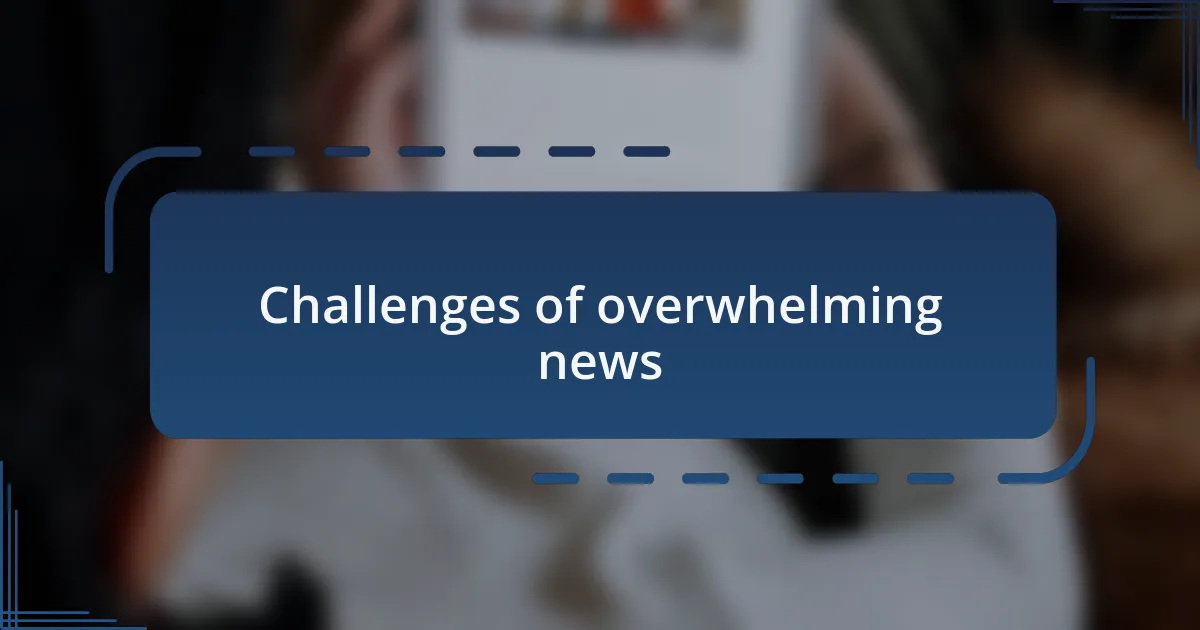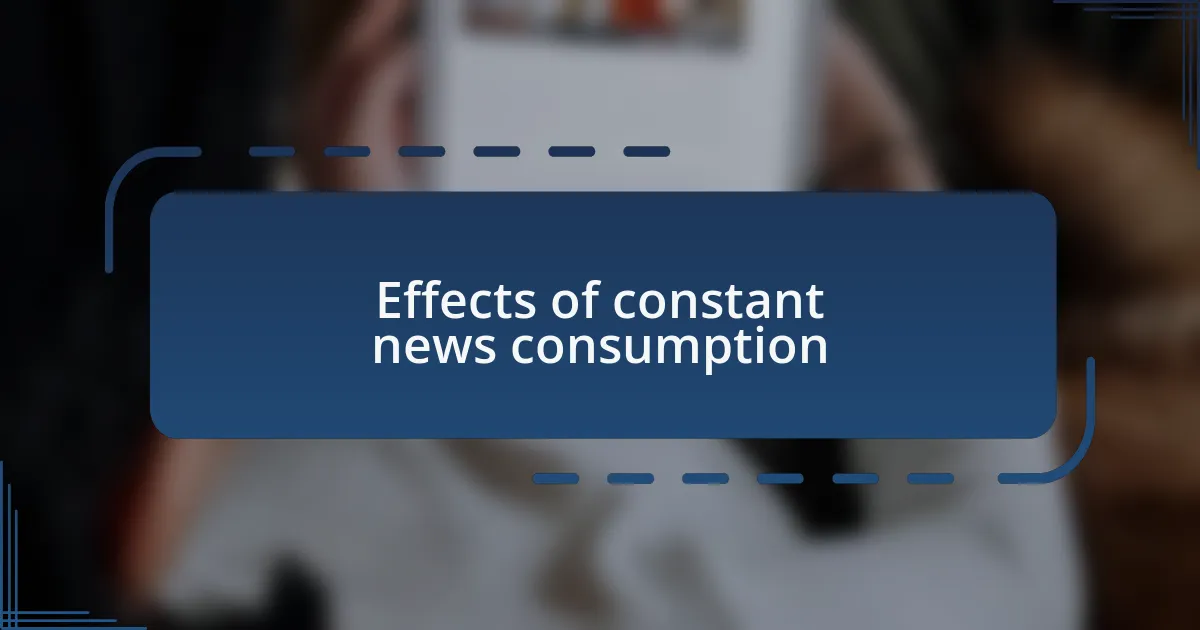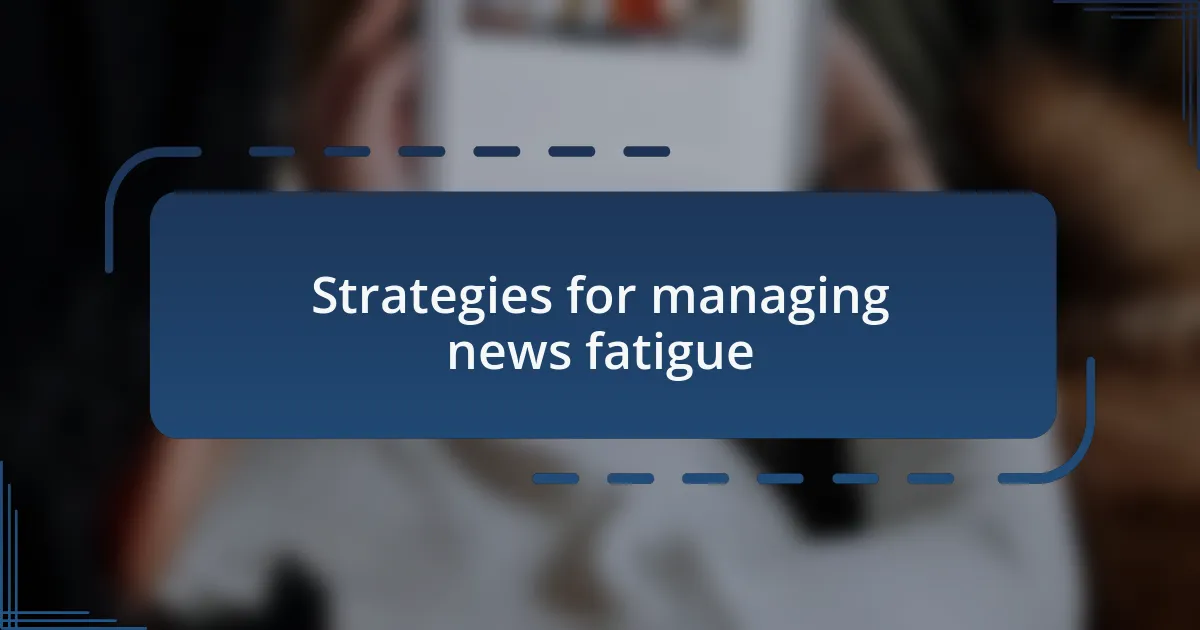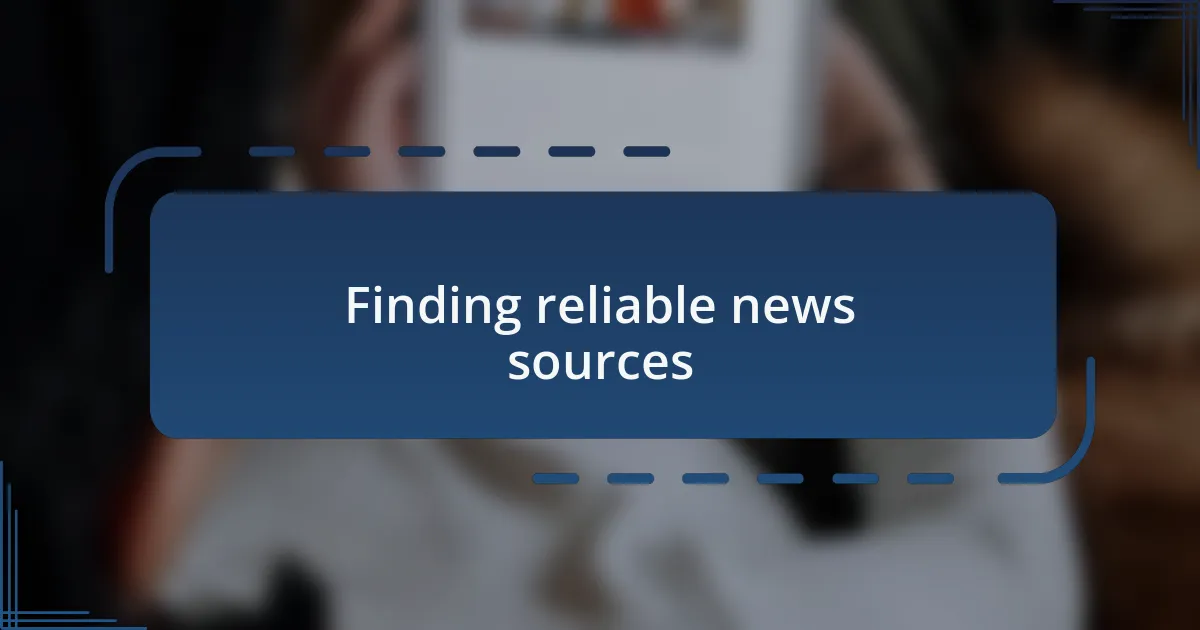Key takeaways:
- UK news media presents diverse perspectives but faces challenges of sensationalism and selective storytelling.
- The overwhelming volume of news can lead to anxiety, impair critical thinking, and diminish empathy.
- Managing news fatigue can be achieved through setting time limits, practicing mindfulness, and exploring positive news stories.
- Reliable news consumption requires vetting sources, cross-referencing information, and utilizing fact-checking websites.

Understanding UK news media
UK news media is a vibrant tapestry woven with diverse voices, reflecting the country’s complexities and nuances. From national outlets like the BBC and The Guardian to regional publications, each source brings its own perspective and priorities. I often find myself wondering how our cultural values shape these narratives – what do we choose to amplify, and what gets lost in the noise?
When I think about the role of UK news media, I can’t help but recall a time when an important local issue received minimal coverage, leaving many community members in the dark. It’s moments like these that highlight the crucial responsibility of news organizations to serve the public interest. How do they determine what stories matter most? The balance between sensationalism and substance often feels precarious, doesn’t it?
Moreover, the rise of digital platforms has transformed how we consume news, often leading to information overload. I remember scrolling through my feed, overwhelmed by an avalanche of headlines, and questioning how to discern credible sources. In this chaotic environment, understanding the landscape of UK news media becomes essential not just for staying informed, but for making sense of our world.

Challenges of overwhelming news
With the constant barrage of news, one of the most pressing challenges is the sheer volume of information we face daily. I remember a day when I tried to catch up on a series of breaking stories and ended up feeling paralyzed, unable to focus on any one issue. It begs the question: How do we filter through this overwhelming noise to find what truly matters to us?
Another significant challenge is the emotional toll that an overwhelming news cycle can take. I can relate to feeling drained after hearing multiple distressing reports in a single sitting. It makes me wonder if there’s a limit to how much we should expose ourselves to. Does staying informed have to come at the cost of our mental well-being?
Moreover, the rapid pace of news can distort our perception of reality. I have found myself reacting impulsively to headlines, only to realize later that the deeper context was lost in the shuffle. This experience raises an important point: How do we cultivate a balanced perspective when everything seems urgent? It’s crucial to navigate these turbulent waters thoughtfully, taking time to explore stories beyond the barrage of sensationalism.

Effects of constant news consumption
Constant news consumption can lead to heightened anxiety. I find myself checking updates repeatedly, almost compulsively, which only adds to an underlying sense of unease. Have you ever felt that pit in your stomach when a breaking news alert pops up on your phone? It’s an unsettling reminder of how news can intertwine with our daily emotions, often leaving us on edge.
The effects often extend beyond just mental health; the overload can impair our ability to think critically. I recall a time when I felt overwhelmed by the number of opinions on a controversial topic. Instead of forming my own viewpoint, I absorbed the noise, leaving me confused and frustrated. This experience makes me think: how can we truly understand complex issues when our minds are clouded by constant information?
Additionally, the continuous cycle of breaking news can diminish our capacity for empathy. When stories flash by so quickly, it’s easy to forget the real people behind the headlines. I remember reading about a significant tragedy, but after a few hours, I found myself scrolling past similar stories without pausing to reflect. How can we nurture compassion in a world that moves at such a frenetic pace? It reminds me of the importance of stepping back to process and connect with the human side of every story.

Strategies for managing news fatigue
Finding ways to manage news fatigue is essential. One effective strategy I’ve adopted is setting specific times for news consumption. Instead of letting news alerts dictate my day, I allocate 30 minutes each morning to catch up. This helps me stay informed without feeling overwhelmed. Have you ever noticed how intentional limits can create a sense of control?
Mindfulness practices can also play a significant role. When I feel the urge to dive into yet another article, I pause and take a few deep breaths. This simple act not only calms my nerves but helps me assess why I’m drawn to the news right now. It raises the question: Are we seeking information or just a distraction from our own thoughts?
Lastly, I’ve found that exploring lighter, positive news can rejuvenate my spirit. Balancing the heavy stories with uplifting ones can change my perspective, reducing the emotional weight I carry. Have you ever watched a feel-good story and felt your mood lift? It’s a reminder that even amidst chaos, there are stories of hope and resilience to cherish.

Finding reliable news sources
When seeking reliable news sources, I often turn to established outlets known for their journalistic integrity. I remember a time when I stumbled upon a sensational story from a lesser-known site that turned out to be misleading. That experience taught me the importance of vetting my sources. Have you ever found yourself questioning the credibility of a news article? It’s a frustrating feeling, but a little diligence can save you from misinformation.
I also make it a habit to cross-reference information across multiple outlets. I recall reading about a major event, and by checking three different news sites, I was able to piece together a more comprehensive picture. It was fascinating to see how different perspectives shed light on the same story. This practice not only enhances my understanding but also deepens my respect for varied journalistic angles.
Another tip is to pay attention to fact-checking websites. During an emotionally charged news cycle, I frequently find myself overwhelmed by the constant barrage of headlines. On days like those, I reach out to resources like Snopes or FactCheck.org. These platforms can clarify quickly whether what I’m reading is grounded in fact, making my quest for the truth feel a bit more manageable. Have you ever thought about how much easier decision-making can be when you have reliable information at your fingertips?